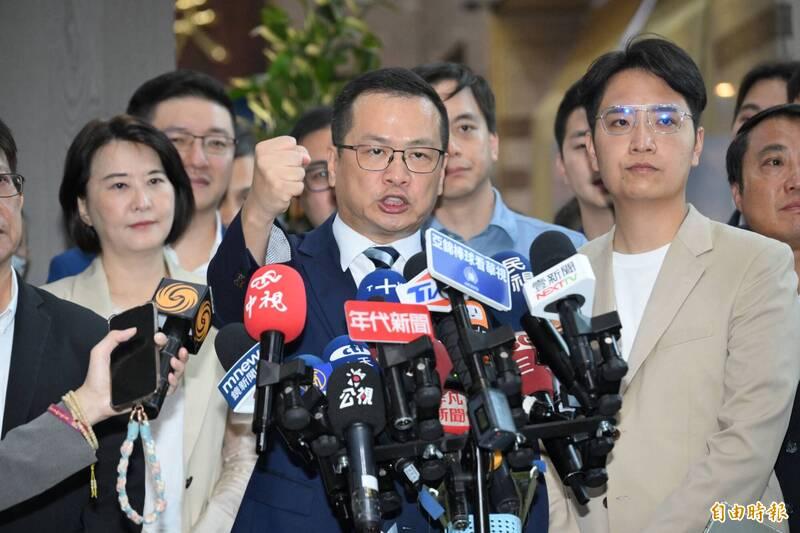Chinese Nationalist Party (KMT) Legislator Lo Chih-chiang (羅智強), former KMT lawmaker Cheng Li-wun (鄭麗文) and former Changhua County commissioner Cho Po-yuan (卓伯源) today registered to run in the party’s chairperson election.
Lo and Cheng each paid an administration fee of NT$3 million (US$99,688) and a deposit of NT$10 million while surrounded by their supporters.
Lo said he believes he is the most appropriate candidate to unite the party, facilitate cooperation with the Taiwan People’s Party and gather grassroots political support.

Photo: Liao Chen-hui, Taipei Times
His goal is for the KMT to win the elections next year and in 2028, he said.
Uniting the opposition is the only way to defeat President William Lai (賴清德), he added.
Today is a day of national disgrace, Cheng said, criticizing the ruling Democratic Progressive Party for “echoing the US’ theory of the undetermined status of Taiwan” on the 80th anniversary of Taiwan’s Retrocession Day.
Cheng said that she is looking forward to a fair and open election within the KMT.
Meanwhile, Cho said that he would promote the direct election of members of the Control Yuan to safeguard people’s rights.
He would also “rescue” KMT workers who are persecuted by an “unfair judiciary,” Cho said.
Regarding cross-strait relations, “one China” is the basis for peace, he said, adding that he supports the “1992 consensus.”
The so-called “1992 consensus,” a term former Mainland Affairs Council chairman Su Chi (蘇起) in 2006 admitted making up in 2000, refers to a tacit understanding between the KMT and the Chinese government that both sides of the Taiwan Strait acknowledge there is “one China,” with each side having its own interpretation of what “China” means.

The manufacture of the remaining 28 M1A2T Abrams tanks Taiwan purchased from the US has recently been completed, and they are expected to be delivered within the next one to two months, a source said yesterday. The Ministry of National Defense is arranging cargo ships to transport the tanks to Taiwan as soon as possible, said the source, who is familiar with the matter. The estimated arrival time ranges from late this month to early next month, the source said. The 28 Abrams tanks make up the third and final batch of a total of 108 tanks, valued at about NT$40.5 billion

Two Taiwanese prosecutors were questioned by Chinese security personnel at their hotel during a trip to China’s Henan Province this month, the Mainland Affairs Council (MAC) said yesterday. The officers had personal information on the prosecutors, including “when they were assigned to their posts, their work locations and job titles,” MAC Deputy Minister and spokesman Liang Wen-chieh (梁文傑) said. On top of asking about their agencies and positions, the officers also questioned the prosecutors about the Cross-Strait Joint Crime-Fighting and Judicial Mutual Assistance Agreement, a pact that serves as the framework for Taiwan-China cooperation on combating crime and providing judicial assistance, Liang

A group from the Taiwanese Designers in Australia association yesterday represented Taiwan at the Midsumma Pride March in Melbourne. The march, held in the St. Kilda suburb, is the city’s largest LGBTQIA+ parade and the flagship event of the annual Midsumma Festival. It attracted more than 45,000 spectators who supported the 400 groups and 10,000 marchers that participated this year, the association said. Taiwanese Designers said they organized a team to march for Taiwan this year, joining politicians, government agencies, professionals and community organizations in showing support for LGBTQIA+ people and diverse communities. As the first country in Asia to legalize same-sex

MOTIVES QUESTIONED The PLA considers Xi’s policies toward Taiwan to be driven by personal considerations rather than military assessment, the Epoch Times reports Chinese President Xi Jinping’s (習近平) latest purge of the Chinese People’s Liberation Army (PLA) leadership might have been prompted by the military’s opposition to plans of invading Taiwan, the Epoch Times said. The Chinese military opposes waging war against Taiwan by a large consensus, putting it at odds with Xi’s vision, the Falun Gong-affiliated daily said in a report on Thursday, citing anonymous sources with insight into the PLA’s inner workings. The opposition is not the opinion of a few generals, but a widely shared view among the PLA cadre, the Epoch Times cited them as saying. “Chinese forces know full well that